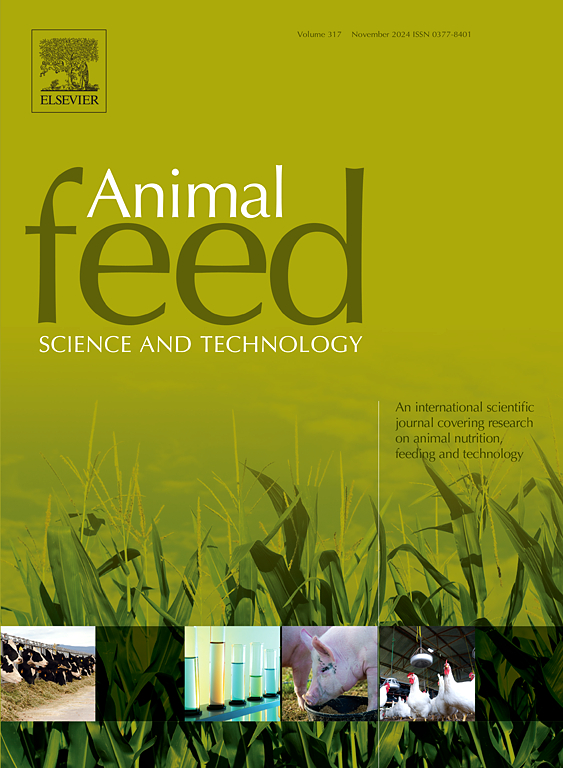海洋微藻粉(Schizochytrium sp.)对绵羊日粮采食量、体内发酵参数、体外产气量和消化率的影响具有剂量依赖性
IF 2.5
2区 农林科学
Q1 AGRICULTURE, DAIRY & ANIMAL SCIENCE
引用次数: 0
摘要
本研究的目的是评估饲喂不添加或添加 2% 或 4% 海洋微藻粉(Schizochytrium sp.)作为二十二碳六烯酸多不饱和脂肪酸(DHA;C22:6 n-3)来源的乳牛的干物质摄入量(DMI)、营养物质摄入量和体内瘤胃发酵情况,以及使用体外技术评估试验日粮的总产气量和消化率。六头体重为 55.6 ± 5.20 千克、年龄为 18 个月的圣伊内斯母牛安装了瘤胃插管,分别饲养在不同的牛栏中。实验设计为双 3 × 3 拉丁正方形(三个处理和三个阶段),每个实验阶段持续 21 天(14 天用于适应日粮,5 天用于样本采集,两个阶段之间有 2 天空白期),共计 63 天。与未饲喂微藻的动物相比,饲喂 4 % 微藻粉的动物显示出较低的 DMI(P<0.05;1,14 vs. 0,86 kg/d)和较低的营养摄入量(P<0.05),但醚提取物(EE;P=0.967)除外。与饲喂添加 2% 和 4% 微藻的日粮相比,未饲喂海洋微藻的乳猪在饲喂后两小时内瘤胃 pH 值较低 (P=0.042),在所有采样时间内瘤胃液中的氨氮 (NH3-N) 浓度较低 (P = 0.011)。添加海洋微藻粉对产热和体外产气没有影响(P>0.05)。日粮中添加海洋微藻后,非纤维碳水化合物(NFC)的体外消化率增加(P = 0.033),4%处理的NFC消化率高于其他处理。此外,海洋微藻粉显著降低了(P = 0.002;0.55-0.47 g/g DM)经灰分和蛋白质校正的中性洗涤纤维(NDF)的体外消化率。添加海洋微藻粉 Schizochytrium sp. 作为 DHA 来源不会对瘤胃发酵产生负面影响。但是,在饲喂 4% 微藻粉的动物中,干物质和营养物质的摄入量以及 NDF 消化率都受到了影响,而在饲喂 2% 微藻粉的动物中,DMI 和营养物质摄入量的减少并不显著。因此,建议在热带条件下使用海洋微藻粉饲喂蛋鸡,浓度为日粮的 2%。本文章由计算机程序翻译,如有差异,请以英文原文为准。
Marine microalgae meal (Schizochytrium sp.) influence on intake, in vivo fermentation parameters and in vitro gas production and digestibility in sheep diets is dose-dependent
The objective of this study was to evaluate the dry matter intake (DMI), intake of nutrients and in vivo ruminal fermentation in wethers fed diets without or with 2 or 4 % of marine microalgae meal (Schizochytrium sp.) as a source of docosahexaenoic polyunsaturated fatty acid (DHA; C22:6 n-3), as well as the total gas production and digestibility of the experimental diets using in vitro techniques. Six Santa Inês wethers with a body weight of 55.6 ± 5.20 kg and 18 months of age fitted with a ruminal cannula, were used and housed in individual stalls. The experimental design consisted of a double 3 ×3 Latin square (three treatments and three periods) with each experimental period lasting 21 days (14 days for adaptation to diets, 5 days for sample collection and 2 days of blank time between periods), for a total of 63 days. Animals fed 4 % microalgae meal showed lower DMI (P<0.05; 1,14 vs. 0,86 kg/d) and lower intake of nutrients (P<0.05), except for ether extract (EE; P=0.967), compared to animals not fed microalgae. Wethers that were not fed marine microalgae had lower ruminal pH just two hours after feeding (P=0.042) and lower concentrations of ammoniacal nitrogen (NH3-N) in the ruminal fluid at all sampling times (P = 0.011) compared to wethers fed diets with 2 and 4 % level inclusion. The addition of marine microalgae meal did not have an effect on heat production and in vitro gas production (P>0.05). The in vitro digestibility of non-fibrous carbohydrates (NFC) increased (P = 0.033) with the inclusion of marine microalgae in the diet, being higher in the 4 % treatment compared to the others. Additionally, marine microalgae meal significantly reduced (P = 0.002; 0.55–0.47 g/g of DM) the in vitro digestibility of neutral detergent fiber corrected for ash and protein (NDF). The inclusion of marine microalgae meal Schizochytrium sp. as a DHA source did not negatively affect ruminal fermentation. However, it compromised dry matter and nutrients intake, as well as NDF digestibility in animals fed 4 % microalgae while a reduction on DMI as well as intake of nutrients at 2 % inclusion was not significant. Therefore, it is recommended to use marine microalgae meal in the feeding of wethers under tropical conditions at a concentration of 2 % of the diet.
求助全文
通过发布文献求助,成功后即可免费获取论文全文。
去求助
来源期刊

Animal Feed Science and Technology
农林科学-奶制品与动物科学
CiteScore
6.00
自引率
6.20%
发文量
266
审稿时长
3 months
期刊介绍:
Animal Feed Science and Technology is a unique journal publishing scientific papers of international interest focusing on animal feeds and their feeding.
Papers describing research on feed for ruminants and non-ruminants, including poultry, horses, companion animals and aquatic animals, are welcome.
The journal covers the following areas:
Nutritive value of feeds (e.g., assessment, improvement)
Methods of conserving and processing feeds that affect their nutritional value
Agronomic and climatic factors influencing the nutritive value of feeds
Utilization of feeds and the improvement of such
Metabolic, production, reproduction and health responses, as well as potential environmental impacts, of diet inputs and feed technologies (e.g., feeds, feed additives, feed components, mycotoxins)
Mathematical models relating directly to animal-feed interactions
Analytical and experimental methods for feed evaluation
Environmental impacts of feed technologies in animal production.
 求助内容:
求助内容: 应助结果提醒方式:
应助结果提醒方式:


